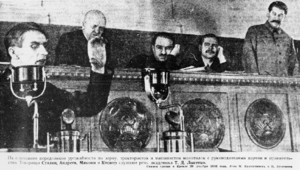
Back ليسينكووية Arabic Lysenkoisme Catalan Lysenkoisme Danish Lyssenkoismus German Λυσενκοϊσμός Greek Lysenkoísmo Spanish Lõssenkism ET لیسنکوئیسم FA Lysenkolaisuus Finnish Lyssenkisme French

Lysenkoism (Russian: лысенковщина, romanized: lysenkovshchina, IPA: [ɫɨˈsʲɛnkəfɕːɪnə]; Ukrainian: лисенківщина, romanized: lysenkivščyna, IPA: [lɪˈsɛnkiu̯ʃtʃɪnɐ]) was a political campaign led by the Soviet biologist Trofim Lysenko against genetics and science-based agriculture in the mid-20th century, rejecting natural selection in favour of a form of Lamarckism, as well as expanding upon the techniques of vernalization and grafting.
More than 3,000 mainstream biologists were dismissed or imprisoned, and numerous scientists were executed in the Soviet campaign to suppress scientific opponents. The president of the Soviet Agriculture Academy, Nikolai Vavilov, who had been Lysenko's mentor, but later denounced him, was sent to prison and died there, while Soviet genetics research was effectively destroyed. Research and teaching in the fields of neurophysiology, cell biology, and many other biological disciplines were harmed or banned.
The government of the Soviet Union (USSR) supported the campaign, and Joseph Stalin personally edited a speech by Lysenko in a way that reflected his support for what would come to be known as Lysenkoism, despite his skepticism toward Lysenko's assertion that all science is class-orientated in nature. Lysenko served as the director of the USSR's Lenin All-Union Academy of Agricultural Sciences. Other countries of the Eastern Bloc including the People's Republic of Poland, the Republic of Czechoslovakia, and the German Democratic Republic accepted Lysenkoism as the official "new biology", to varying degrees, as did the People's Republic of China for some years.